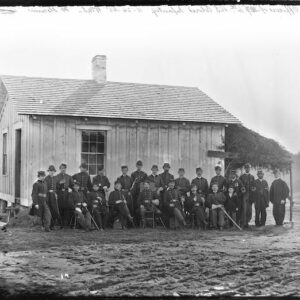Tag: Fleetwood (Christian A.)
 Wikipedia says: Christian Abraham Fleetwood (July 21, 1840 – September 28, 1914), was an African American non-commissioned officer in the United States Army, a commissioned officer in the D.C. National Guard, an editor, a musician, and a government official. He received the Medal of Honor for his actions during the American Civil War.
Wikipedia says: Christian Abraham Fleetwood (July 21, 1840 – September 28, 1914), was an African American non-commissioned officer in the United States Army, a commissioned officer in the D.C. National Guard, an editor, a musician, and a government official. He received the Medal of Honor for his actions during the American Civil War.
Fleetwood was born in Baltimore on July 21, 1840, the son of Charles and Anna Maria Fleetwood, both were free persons of color. He received his early education in the home of a wealthy sugar merchant and chairman of Baltimore’s chamber of commerce, John C. Brunes, and his wife. The latter treated Fleetwood like her son and taught him to read and write. He continued his education at the Maryland State Colonization Society, went briefly to Liberia and Sierra Leone, and graduated in 1860 from Ashmun Institute (later known as Lincoln University) in Oxford, Pennsylvania. He established and published The Lyceum Observer, said to be the first newspaper in the Upper South to be owned and operated by an African American.
When the American Civil War disrupted travel by ship to Liberia, Fleetwood went to Baltimore’s Camp Birney and enlisted into Company G of the 4th Regiment United States Colored Infantry, Union Army, on August 11 or August 17, 1863. Due to his educated background, Fleetwood was given the rank of sergeant upon enlistment and was promoted to sergeant major on August 19. His regiment, assigned to the 3rd Division, saw service with the 10th, 18th, and 25th Army Corps in campaigns in North Carolina and Virginia, particularly on July 16, 1864, in the Battle of Petersburg and on September 29–30, 1864, in the Battle of Chaffin’s Farm.
On September 29, 1864, the 3rd Division, including Fleetwood’s regiment, participated in the Battle of Chaffin’s Farm on the outskirts of the Confederate capital of Richmond, Virginia. During the 4th Regiment’s charge on the enemy fortifications, Fleetwood supervised the unit’s left flank. Among the charging soldiers was Sergeant Alfred B. Hilton, the bearer of two flags, one of which had been seized from a wounded sergeant. When Hilton himself was wounded, Fleetwood and another soldier, Charles Veale, each grabbed a flag from him before the colors could touch the ground. Now carrying the American flag, Fleetwood continued forward under heavy fire until it became clear that the unit could not penetrate the enemy defenses. Retreating back to the reserve line, he used the flag to rally a small group of men and continue the fight. For their actions during the battle, Fleetwood, Hilton, and Veale were each issued the Medal of Honor just over six months later, on April 6, 1865. Fleetwood’s official Medal of Honor citation reads simply: “Seized the colors, after 2 color bearers had been shot down, and bore them nobly through the fight.” The medal is now part of the collection of the Smithsonian’s National Museum of American History. Fleetwood also won a General B. F. Butler Medal, presumably for his action in the same engagement.
Although every officer of the regiment sent a petition for him to be commissioned an officer, Secretary of War Edwin Stanton did not recommend appointment. Fleetwood was honorably discharged from the Army on May 4, 1866. Fleetwood’s 1864 service is in part detailed in a diary he wrote that year full of entries about his experiences during the war.
Showing the single result
